Which is the Best Probiotic for IBS? 13 Science-backed
Discover the best probiotic for IBS supplements to relieve IBS symptoms and improve gut health. Start your journey towards digestive relief today.
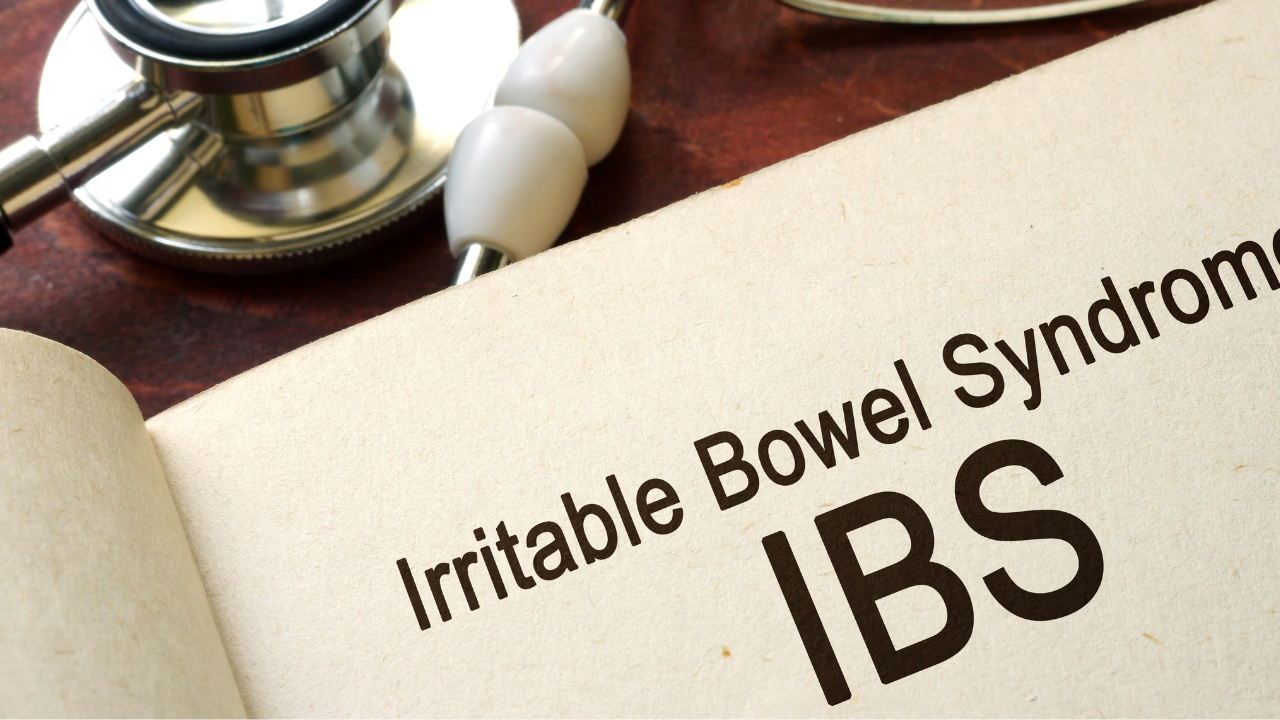
Looking for relief from IBS symptoms? Discover the best probiotic for IBS and improve your gut health today! Our science-backed recommendations and reviews will help you choose the right probiotic supplement for your needs. Say goodbye to bloating, gas, and other uncomfortable symptoms with the help of the best probiotic for IBS.
In This Article
The diagnosis of Irritable Bowel Syndrome (IBS) is based on symptoms taken as criteria for determining the condition.
There is no specific test to diagnose IBS, and the diagnosis is usually made by a healthcare provider based on the patient's symptoms and medical history.
According to the Rome IV criteria, IBS is diagnosed when a patient has recurrent abdominal pain, on average, at least one day per week in the last three months, associated with two or more of the following criteria: related to defecation, associated with a change in frequency of stool, or associated with a change in form (appearance) of stool. The symptoms should have started at least six months before diagnosis✅.
| Diagnostic Criteria | Description |
|---|---|
| Recurrent abdominal pain | On average, at least one day per week in the last three months |
| Associated with two or more of the following criteria | Related to defecation, associated with a change in frequency of stool, or associated with a change in form (appearance) of stool |
| Duration of symptoms | Symptoms should have started at least six months before diagnosis |
Small Bowel Bacterial Overgrowth
Small bowel bacterial overgrowth (SBBO) is a condition characterized by an abnormally high population of bacteria in the small intestine.
It is associated with symptoms such as pain, bloating, diarrhea, and signs of malabsorption, similar to those observed in people with IBS.
Generally, IBS patients experience changes in Lactobacillus and Bifidobacterium composition and activity, impacting their digestive health and overall well-being.
Studies show that those with IBS have lower levels of microbial diversity and are more likely to have a reduced presence of Methanobacteriales and a higher prevalence of Bacteroides enterotypes✅.
Lower counts of methanogens may explain the symptoms of flatulence or excess gas in the abdomen.
In patients with IBS, there is an overgrowth of certain types of bacteria, specifically Proteobacteria (Veillonella) and Firmicutes (Lactobacillus and Ruminococcus), while other beneficial bacteria like Bifidobacterium, Faecalibacterium, Erysipelotrichaceae, and methanogens are decreased✅.
This imbalance (Dysbiosis) in gut bacteria may contribute to the symptoms experienced by those with IBS.
How Probiotics Help IBS
First of all, we need to understand the pathophysiology of IBS involves various central and peripheral mechanisms, and the management of gut microbiota can significantly affect the improvement of subjective disorders in patients with IBS.
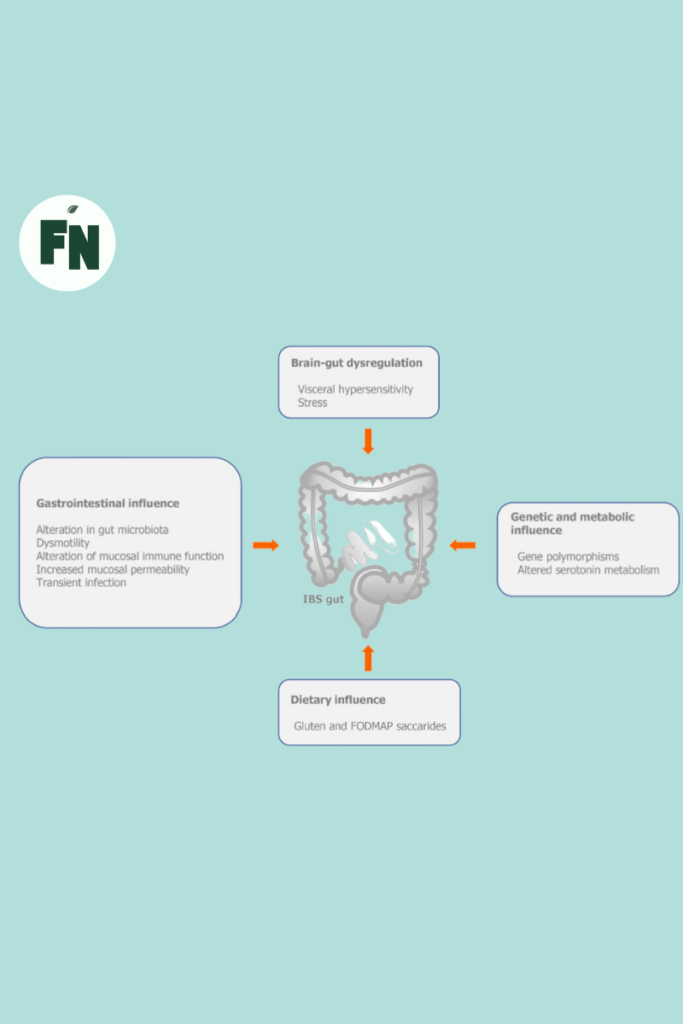
Although the pathophysiology of IBS has not been fully elucidated, nowadays, we
can claim with certainty that IBS is an unexplained brain-gut disorder✅.
Gut microbiota plays a role in brain-gut dysregulation in patients with IBS through the microbiota-brain axis.
The most important communication pathway in this relationship is the vagus nerve, which connects the gut and the brain.
The gut microbiota can produce neurotransmitters and metabolites that can affect mood and behavior in humans.
Some studies have shown that ingestion of fermented milk products with probiotics can modulate brain activity and regulate emotional behavior and central GABA receptor expression in mice via the vagus nerve✅.
In visceral sensitivity, gut microbiota can produce gases such as hydrogen sulfide (H2S), which can influence intestinal inflammation and sensitivity and play an important role in modulating visceral pain.
Additionally, studies have shown that probiotics such as Lactobacillus reuteri can directly alter the visceral perception of nociceptive stimulants and inhibit the autonomic nervous system response to colorectal distension in mice✅.
Bacteria can produce short-chain fatty acids (SCFAs) that stimulate the secretion of gastrointestinal hormones that regulate gut motility.
Moreover, some studies have shown that gut microbiota can affect the enteric nervous system and the interstitial cells of Cajal, which are involved in regulating intestinal motility✅.
Some specific strains of bacteria such as Bacteroides thetaiotaomicron, Escherichia coli Nissle 1917, and Lactobacillus rhamnosus have been shown to alter gene expression and improve contractility of the colon✅.
The gut microbiota is a fascinating world within us that interacts with our intestinal epithelium and helps regulate the expression of tight junction proteins✅.
These proteins are crucial for maintaining the integrity of our intestinal barrier function.
Unfortunately, when this barrier is disrupted, it can lead to increased intestinal permeability and inflammation.
But did you know that the metabolites produced by the gut microbiota can also influence the activation of our immune system and inflammation in the gut?
Some bacteria produce lipopolysaccharides (LPS), which can activate the immune system and promote inflammation.
List of Best Probiotics for IBS
Here is the list of the 6 best probiotics for IBS patients. These recommended probiotics products are ones with trusted sustainability certification(s) and USDA Organic:
Physician's CHOICE Probiotics 60 Billion CFU Best Price
Garden of Life Raw Probiotics Ultimate Care Best Formula
Garden of Life Once Daily Dr. Formulated Probiotics Best for Women
Garden of Life Probiotics for Men Dr. Formulated Best for Men
MaryRuth's USDA Organic Liquid Probiotics Best for Child/Pregnant
Garden of Life Whole Food Probiotic Supplement Best Overall
Best Probiotics For IBS
Probiotics have been suggested as a possible therapeutic option for the treatment of IBS.
Probiotics are live microorganisms that can confer health benefits to the host when administered in adequate amounts.
Probiotics can modulate the gut microbiota and improve gut barrier function, reduce inflammation, and regulate intestinal motility in patients with IBS.
Some specific strains of probiotics, such as Bifidobacterium infantis, Lactobacillus plantarum, and Streptococcus thermophilus, have been shown to improve IBS symptoms in clinical trials.
However, more research is needed to determine the optimal dose, duration, and strain of probiotics for the treatment of IBS.
Additionally, other therapeutic options such as prebiotics, synbiotics, and fecal microbiota transplantation (FMT) have also shown promising results in improving IBS symptoms.
Some studies have shown that certain probiotics can alleviate symptoms in specific IBS subtypes.
For example, Bacillus coagulans MTCC 5856 was successful in alleviating symptoms in patients with a predominantly diarrheal form of the disease.
Another study found that a combination of probiotic strains improved symptoms in patients with a predominantly abdominal pain form of the disease.
Read more:
11 Best Probiotic Multi-Enzyme for Women
11 Best Probiotic For Women To Support Gut Health
8 Lifestyles In Covid-19 Stage To Get A Strong Immunity
Best Health Benefits Of Fermented Plant-Based Foods For Covid-19 Patients
Physician's CHOICE Probiotics 60 Billion CFU
Physician’s CHOICE Probiotics 60 Billion CFU
- Capsule
- 100K+ bought in past month
- 4.5 out of 5 stars
- Price: $19.77 ($0.66 / Count)
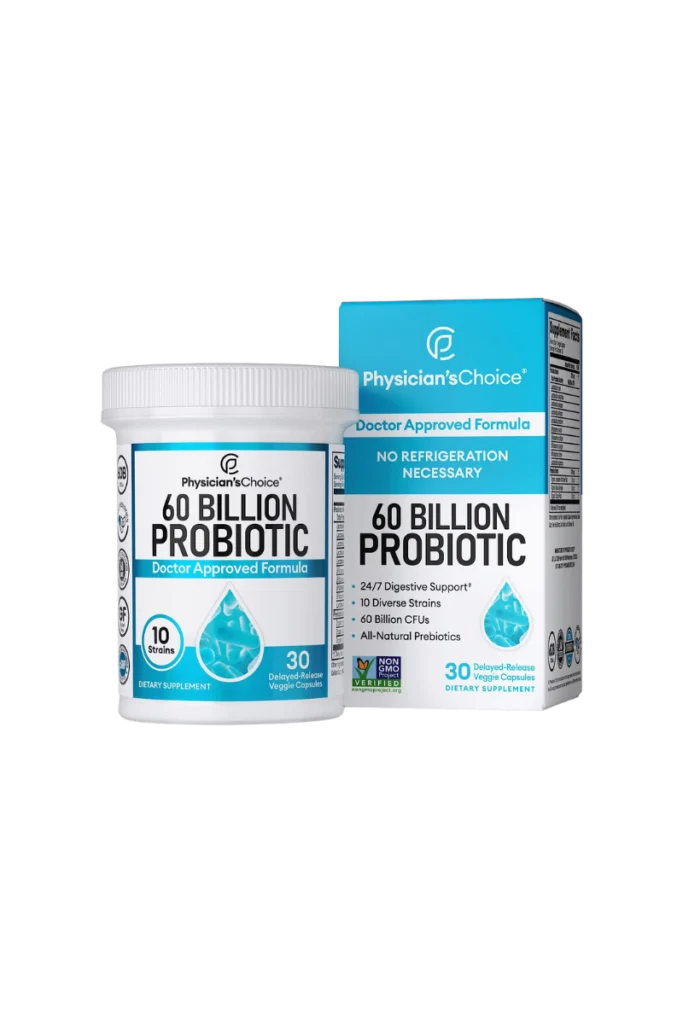
Garden of Life Raw Probiotics UltimateBest-Probiotic-Formulas Care 100 Billion CFU
Garden of Life Raw Probiotics Ultimate Care 100 Billion CFU
- Capsule
- 10K+ bought in past month
- 4.6 out of 5 stars
- Price: $37.90 ($1.26 / Count)
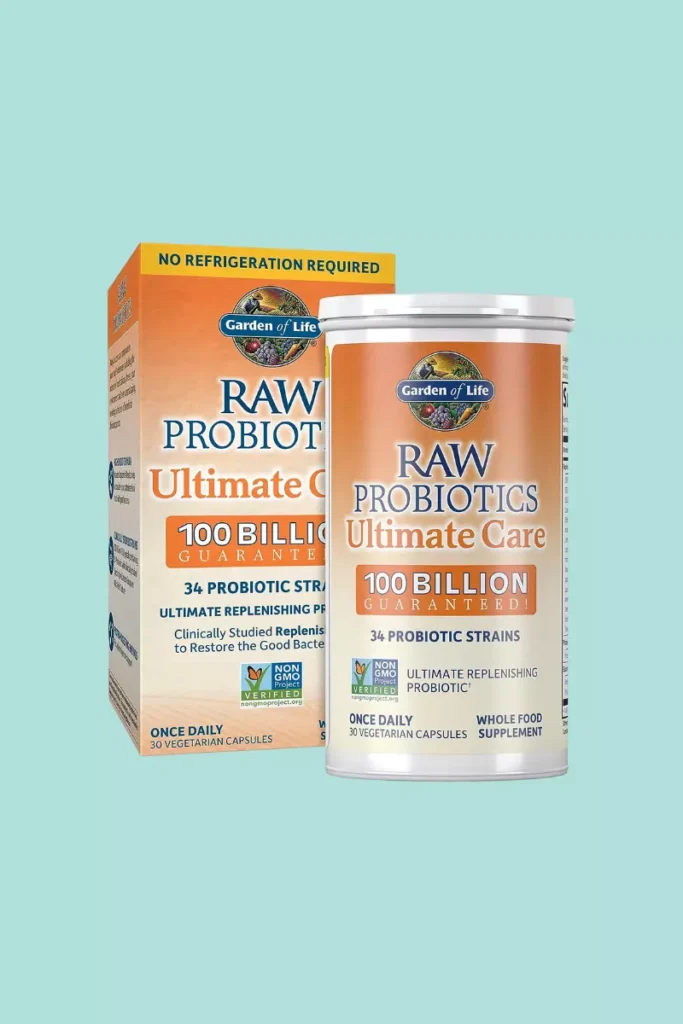
Garden of Life Once Daily Dr. Formulated Probiotics 50 Billion CFU
Garden of Life Once Daily Dr. Formulated Probiotics 50 Billion CFU
- Capsule
- 100K+ bought in past month
- 4.6 out of 5 stars
- Price:$29.94($1.00/Count)
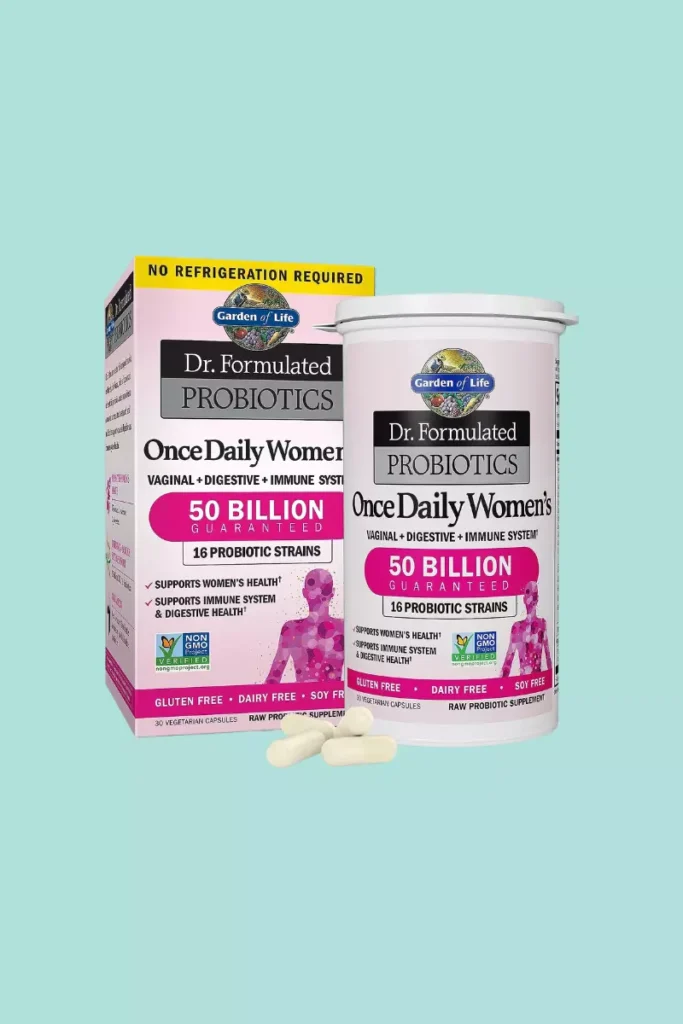
Garden of Life Probiotics for Men Dr. Formulated 50 Billion CFU
Garden of Life Probiotics for Men Dr. Formulated 50 Billion CFU
- Capsule
- 20K+ bought in past month
- 4.6 out of 5 stars
- Price:$29.94($1.00/Count)
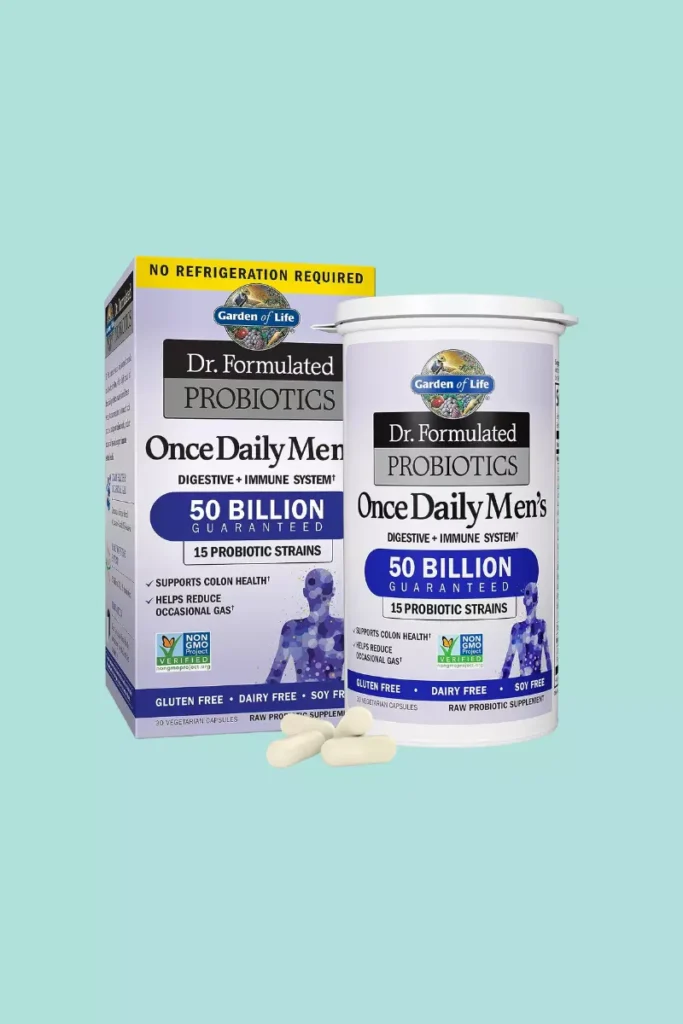
MaryRuth's USDA Organic Liquid Probiotics
MaryRuth’s USDA Organic Liquid Probiotics
- Liquid
- 10K+ bought in past month
- 4.6 out of 5 stars
- Price: $43.99 ($43.99/Count)
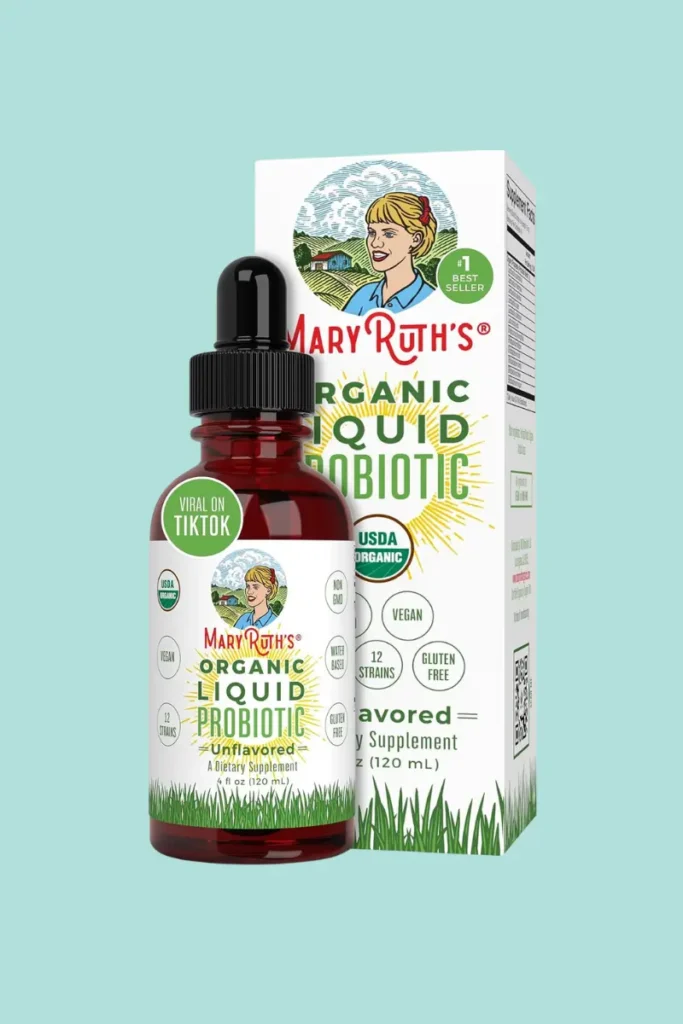
Garden of Life Whole Food Probiotic Supplement
Garden of Life Whole Food Probiotic Supplement
- Capsule
- 2K+ bought in past month
- 4.7 out of 5 stars
- Price: $69.34 ($0.32 / Count)
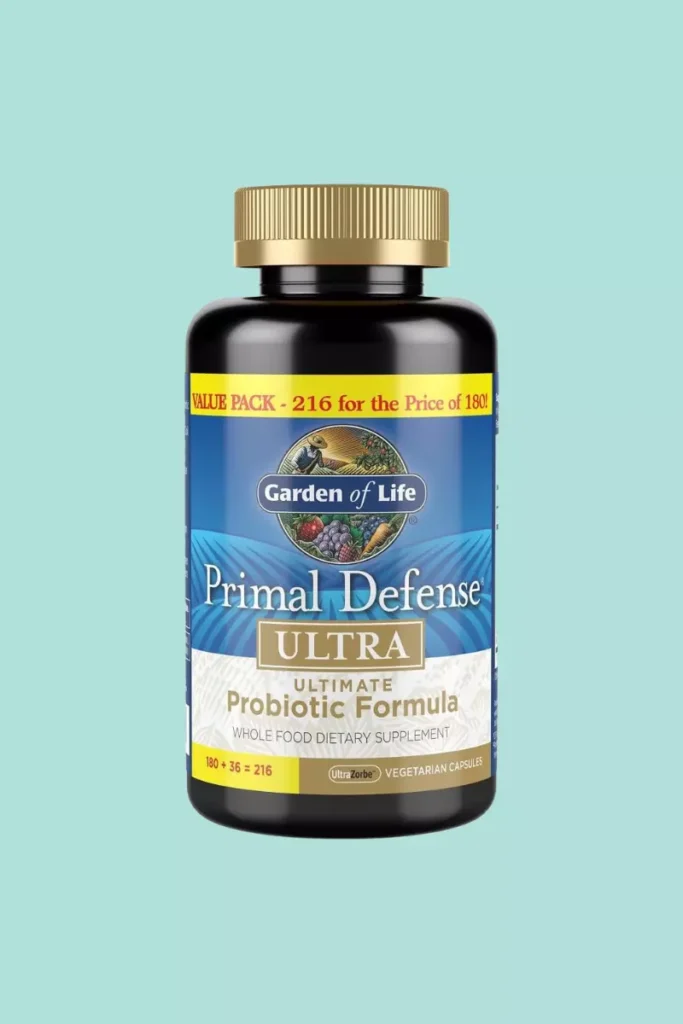
Best Probiotic For IBS Symptoms
List of Probiotics for IBS Symptoms:
Here is the list of the 7 best probiotics for IBS symptoms. These recommended probiotics products are ones with trusted sustainability certification(s) and USDA Organic:
Probiotics can improve global IBS symptoms, while others only improve individual IBS symptoms, such as bloating scores and abdominal pain scores.
Only a few clinical trials have found no apparent effect of probiotics on IBS symptoms.
Generally, probiotics appear to be safe for patients with IBS.
A meta-analysis of randomized controlled trials showed that probiotics were more effective than placebo in improving overall IBS symptoms, abdominal pain, bloating, and flatulence.
| Ref. | Sample size | Probiotic | Common Outcome (probiotic group) |
|---|---|---|---|
| Sinn et al ✅, 2008 | 40 | L.acidophillus | A decrease in visceral hypersensitivity in both groups decreased pain in both groups, and no significant difference in overall symptom improvement |
| Hong et al ✅, 2009 | 70 | Bifidobacterium bifidum BGN4, B. lactis AD011, Lactobacillus acidophilus AD031, L. casei IBS041 | Improvement in the frequency of abdominal pain (23% vs 6%), abdominal distension (27% vs 7%), bowel habits (26% vs 8%), and dissatisfaction with defecation (20% vs 10%). |
| Guglielmetti et al ✅, 2011 | 122 | Bifidobacterium bifidum MIMBb75 | Improved global IBS symptoms by -0.88 points, reduction in pain/discomfort by -0.82 points, distention/bloating by -0.92 points, urgency by -0.76 points (Likert scale) |
| Cui and Hu✅, 2012 | 60 | Bifidobacterium longum and Lactobacillus acidophilus | Reduction of pain score (-31.9), defecation and discomfort (-29.2), no significant change in QOL and bowel habits (defecation frequency and stool consistency) |
| Dapoigny et al ✅, 2012 | 50 | Lactobacillus casei rhamnosus LCR35 | D: significant reduction in abdominal pain; M: no relevant difference between groups |
| Ducrotté et al✅, 2012 | 214 | Lactobacillus plantarum 299v | The mean frequency of abdominal pain was reduced significantly by 51.9%, with reductions in stool frequency, bloating and feeling of incomplete emptying, significant reduction of the daily number of stools |
| Amirimani et al✅, 2013 | 102 | Lactobacillus reuteri | Adequate relief of symptoms at least 50% of the time (52% vs 41%), no difference in diarrhea, bloating, and satiety |
| Begtrup et al✅, 2013 | 131 | L. paracasei ssp paracasei F19, L. Acidophilus; La5 and Bifidobacterium Bb12 | Improvements in symptoms scores, bloating, flatulence, ease of bowel movement, and quality of life (48% vs 33%) |
| Roberts et al ✅, 2013 | 179 | Bifidobacterium lactis CNCM I-2494, S.thermophilus, L.bulgaris | Increased frequency of defecation, no significant difference in bloating, urgency, abdominal pain, or stool shape. The study did not classify between D and C subtype |
| Jafari et al ✅, 2014 | 108 | Probio-Tec® Quatro-cap-4 | Decrease in VAS score for abdominal pain and bloating, decrease in feeling incomplete defecation |
| Ludidi et al ✅, 2014 | 40 | Bifidobacterium lactis W52, Lactobacillus casei W56, L. salivarius W57, Lactococcus lactis W58, L. acidophilus NCFM, and L. rhamnosus W71 | A decrease in visceral hypersensitivity in both groups decreased pain in both groups and no significant difference in overall symptom improvement |
| Pedersen et al ✅, 2014 | 81 | Lactobacillus rhamnosus GG | Improvement in IBS-SSS score and QOL score. Low FODMAP diet showed efficiency in IBS-C, and probiotics in IBC-D. |
| Improvement in IBS-SSS score and QOL score. Low FODMAP diet showed efficiency in IBS-C and probiotics in IBC-D. | 186 | Lactobacillus rhamnosus NCIMB 30174, L.plantarum NCIMB 30173, L.Acidophilus NCIMB 30175, Enterococcus faecium NCIMB 30176 | Reduction in IBS-SSS score (abdominal pain, bloating, bowel habit satisfaction)-63.3 vs -28.3. No difference in QOL score. |
The probiotic bacteria that are most frequently used in studies include Lactobacillus, Bifidobacterium, Enterococcus, and Streptococcus.
In the majority of studies that have examined the effects of these probiotics, there has been a significant reduction in abdominal pain and discomfort.
However, the effect size of probiotics was small, and the quality of evidence was low to moderate
The symptoms of IBS include:
- Abdominal distension
- Bloating
- Flatulence
- Diarrhea
- Constipation
- A combination of two or more of these symptoms
IBS can be classified into different subtypes based on bowel habit patterns. The following are the three main IBS subtypes:
- IBS with constipation (IBS-C): This subtype is characterized by infrequent bowel movements and hard, lumpy stools.
- IBS with diarrhea (IBS-D): This subtype is characterized by frequent bowel movements and loose, watery stools.
- IBS with mixed bowel habits (IBS-M): This subtype is characterized by a combination of both constipation and diarrhea.
DocDigest by Design IBS-D Diarrhea Probiotics
DocDigest by Design IBS-D Diarrhea Probiotics
- Capsule
- 2K+ bought in past month
- 3.9 out of 5 stars
- Price: $29.99 ($1.00$1.00 / Count)
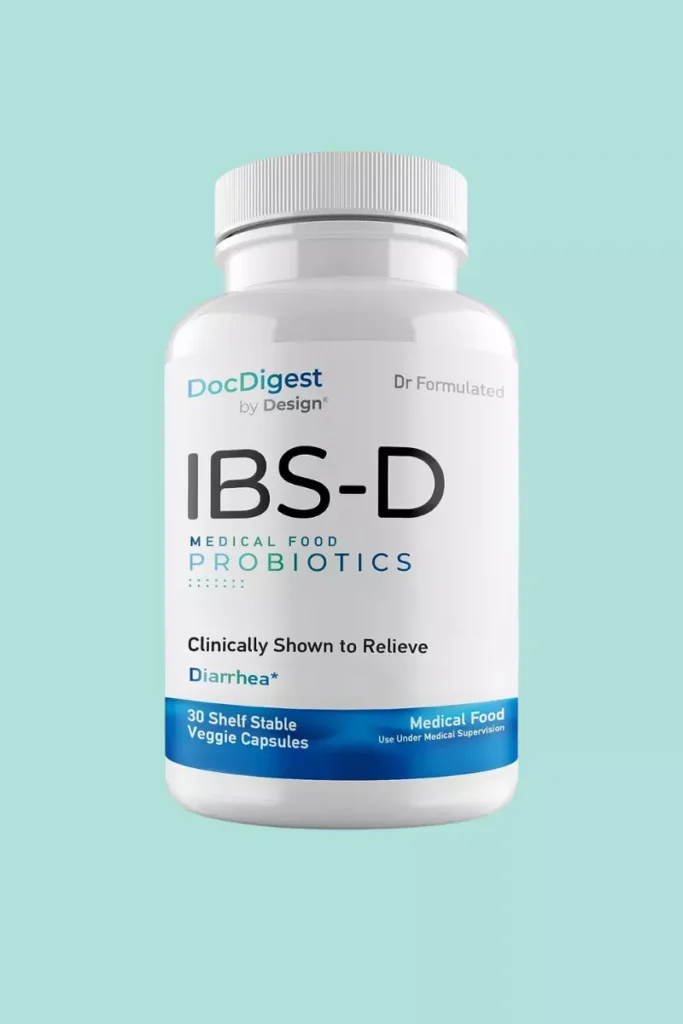
Hyperbiotics Pro 15 Probiotic Time Release Pearls
Hyperbiotics Pro 15 Probiotic Time Release Pearls
- Tablet
- 6K+ bought in past month
- 4.5 out of 5 stars
- Price: $29.44 ($0.49 / Count)
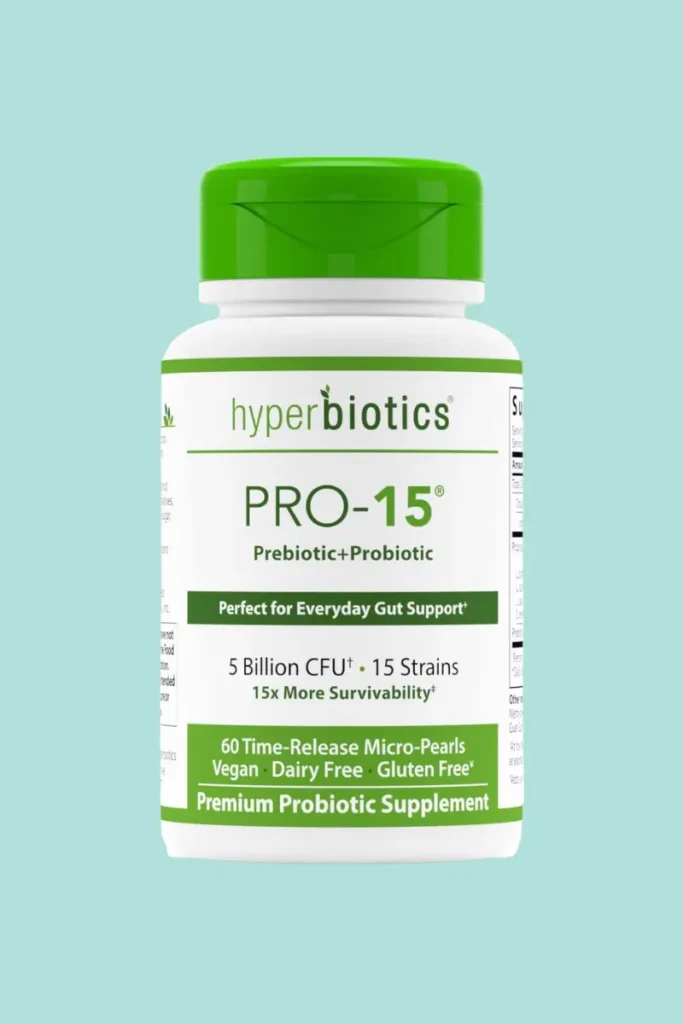
Endomune Advanced Adult Multi-Strain Probiotic Supplement with Prebiotic
Endomune Advanced Adult Multi-Strain Probiotic Supplement with Prebiotic
- Capsule
- 800+ bought in past month
- 4.7 out of 5 stars
- Price: $40.46 ($0.67 / Count))
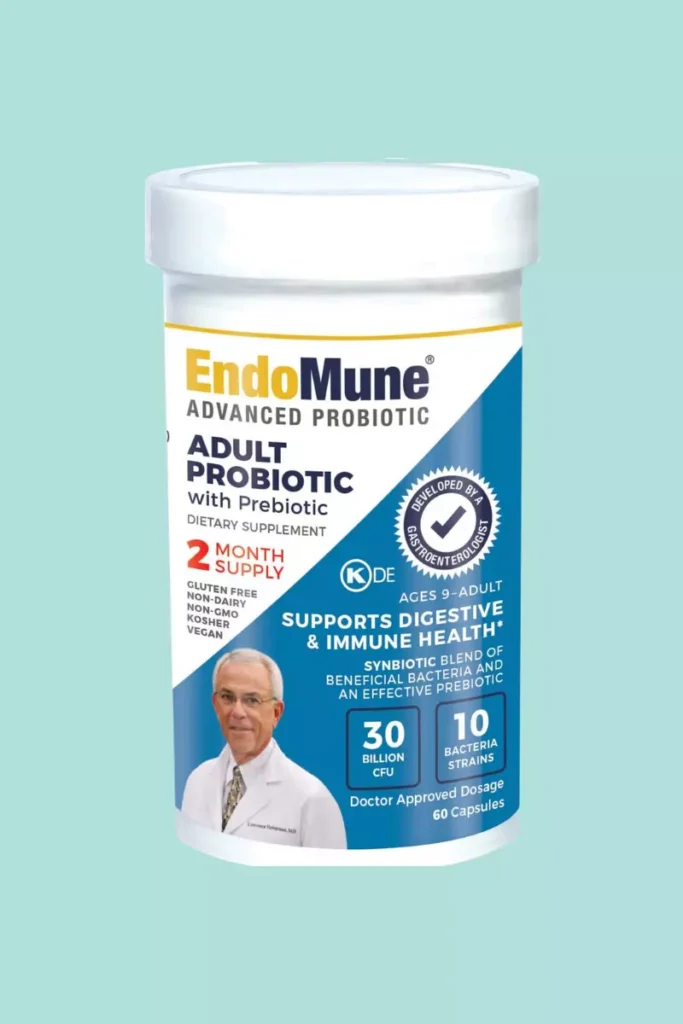
Probiotics-for-Women Digestive Health
Probiotics for Women’s Digestive Health
- Tablet
- 2K+ bought in past month
- 4.4 out of 5 stars
- Price: $15.28 ($0.17 / Count)
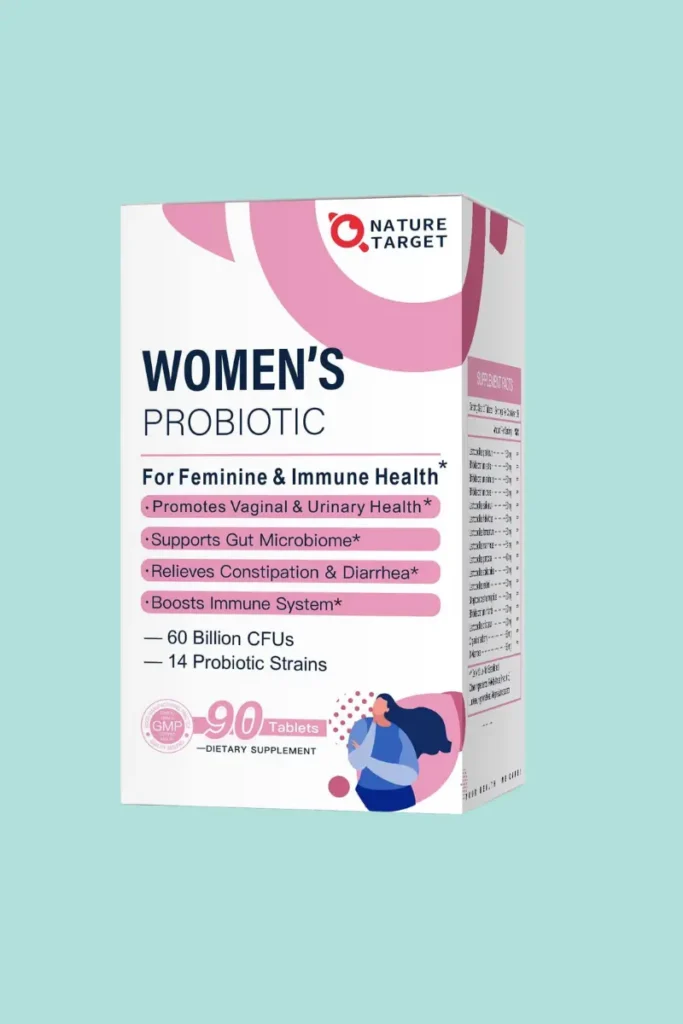
Supersmart - H. Pylori Fight Natural Treatment 20 Billion CFU
Supersmart – H. Pylori Fight Natural Treatment 20 Billion CFU per Day
- Capsule
- 200+ bought in past month
- 4.3 out of 5 stars
- Price: $45.00 ($0.38 / Count)
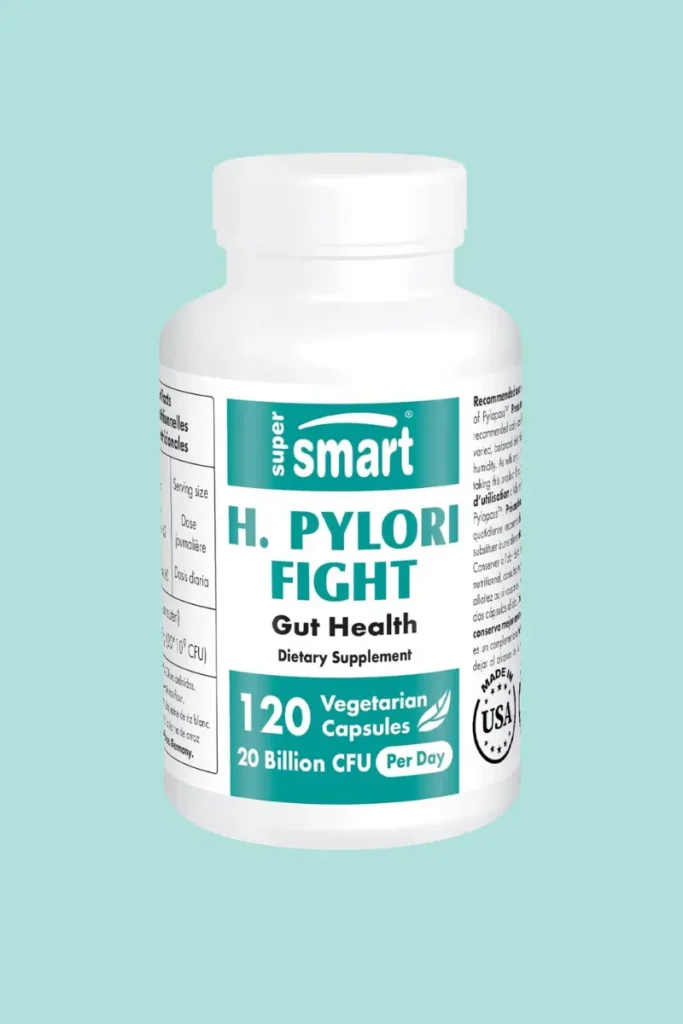
Inessa Advanced Daily Biotic, Probiotics Lactobacillus Rhamnosus
Inessa Advanced Daily Biotic, Probiotics Lactobacillus Rhamnosus
- Capsule
- 1K+ bought in past month
- 4.4 out of 5 stars
- Price: $24.30 ($0.41 / Count)
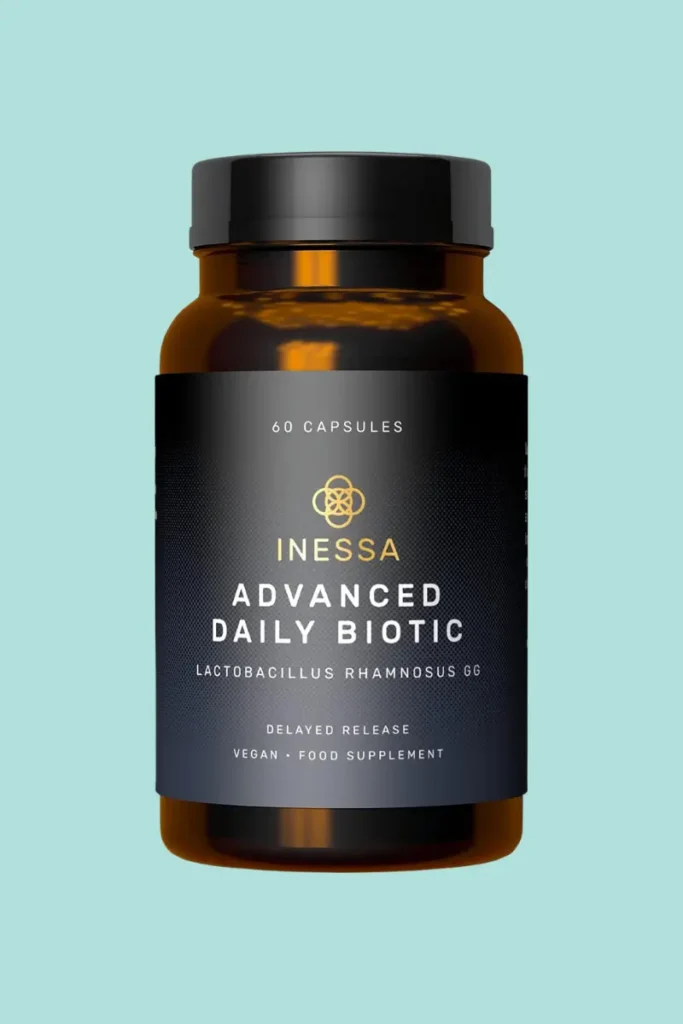
Klaire Labs Saccharomyces Boulardii Probiotic
Klaire Labs Saccharomyces Boulardii Probiotic
- Capsule
- 200+ bought in past month
- 4.6 out of 5 stars
- Price: $56.99 ($0.47$0.47 / Count)
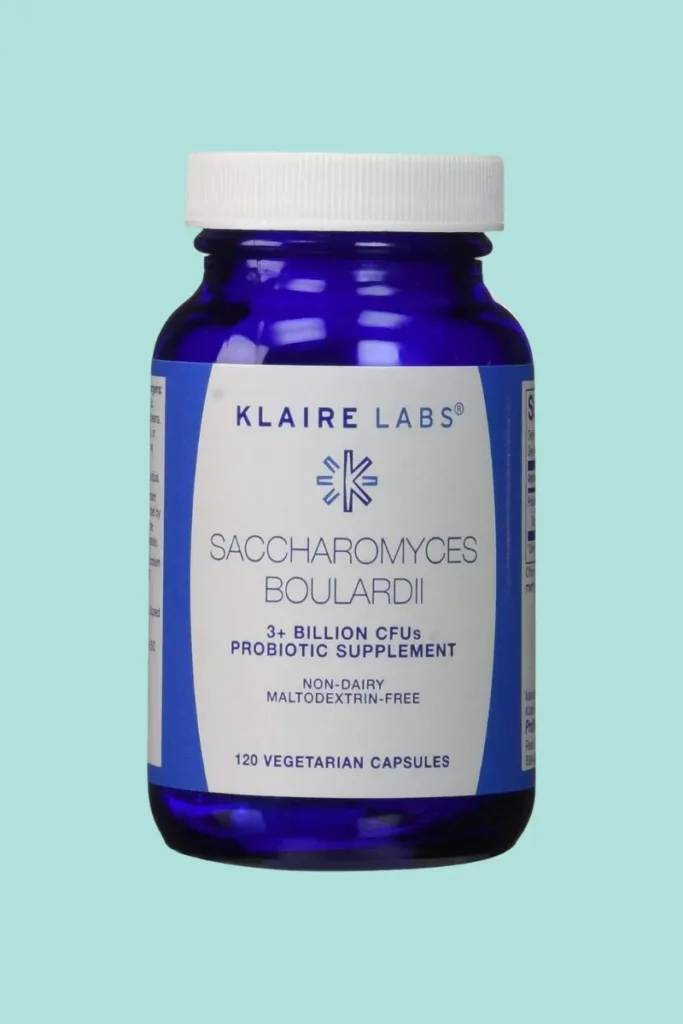
Frequently Asked Questions
Should IBS sufferers take probiotics?
What is the best probiotic to take for irritable bowel syndrome?
Which probiotic is best for bloating and gas?
What are the coping strategies for IBS?
21 References
- Amirimani, Behnaz, et al. “Probiotic vs. Placebo in Irritable Bowel Syndrome:A Randomized Controlled Trial.” Middle East Journal of Digestive Diseases, vol. 5, no. 2, Apr. 2013, pp. 98–102.
- Bär, F., et al. “Cell‐free Supernatants of Escherichia Coli Nissle 1917 Modulate Human Colonic Motility: Evidence from an in Vitro Organ Bath Study.” Neurogastroenterology & Motility, vol. 21, no. 5, pp. 559-e17, https://doi.org/10.1111/j.1365-2982.2008.01258.x. Accessed 21 Aug. 2023.
- Begtrup, Luise Mølenberg, et al. “Long-Term Treatment with Probiotics in Primary Care Patients with Irritable Bowel Syndrome – a Randomised, Double-Blind, Placebo Controlled Trial.” Scandinavian Journal of Gastroenterology, vol. 48, no. 10, Aug. 2013, pp. 1127–35, https://doi.org/10.3109/00365521.2013.825314.
- Bischoff, Stephan C., et al. “Intestinal Permeability – a New Target for Disease Prevention and Therapy.” BMC Gastroenterology, vol. 14, no. 1, Nov. 2014, pp. 1–25, https://doi.org/10.1186/s12876-014-0189-7.
- Cui, Shusheng, and Ying Hu. “Multistrain Probiotic Preparation Significantly Reduces Symptoms of Irritable Bowel Syndrome in a Double-Blind Placebo-Controlled Study.” International Journal of Clinical and Experimental Medicine, vol. 5, no. 3, 2012, pp. 238–44.
- Dapoigny, Michel, et al. “Efficacy and Safety Profile of LCR35 Complete Freeze-Dried Culture in Irritable Bowel Syndrome: A Randomized, Double-Blind Study.” World Journal of Gastroenterology, vol. 18, no. 17, May 2012, pp. 2067–75, https://doi.org/10.3748/wjg.v18.i17.2067.
- Ducrotté, Philippe, et al. “Clinical Trial: Lactobacillus Plantarum 299v (DSM 9843) Improves Symptoms of Irritable Bowel Syndrome.” World Journal of Gastroenterology, vol. 18, no. 30, Aug. 2012, pp. 4012–18, https://doi.org/10.3748/wjg.v18.i30.4012.
- Guglielmetti, S., et al. “Randomised Clinical Trial: Bifidobacterium Bifidum MIMBb75 Significantly Alleviates Irritable Bowel Syndrome and Improves Quality of Life –– a Double‐blind, Placebo‐controlled Study.” Alimentary Pharmacology & Therapeutics, vol. 33, no. 10, pp. 1123–32, https://doi.org/10.1111/j.1365-2036.2011.04633.x. Accessed 21 Aug. 2023.
- Hong, Kyoung Sup, et al. Gut and Liver. 30 June 2009, https://www.gutnliver.org/journal/view.html?volume=3&number=2&spage=101&year=2009. Accessed 21 Aug. 2023.
- Kamiya, T., et al. “Inhibitory Effects of Lactobacillus Reuteri on Visceral Pain Induced by Colorectal Distension in Sprague-Dawley Rats.” Gut, vol. 55, no. 2, Feb. 2006, pp. 191–96, https://doi.org/10.1136/gut.2005.070987.
- Lacy, Brian E., et al. “Bowel Disorders.” Gastroenterology, vol. 150, no. 6, May 2016, pp. 1393-1407.e5, https://doi.org/10.1053/j.gastro.2016.02.031.
- Ludidi, S., et al. “Randomized Clinical Trial on the Effect of a Multispecies Probiotic on Visceroperception in Hypersensitive IBS Patients.” Neurogastroenterology & Motility, vol. 26, no. 5, pp. 705–14, https://doi.org/10.1111/nmo.12320. Accessed 21 Aug. 2023.
- Pedersen, Natalia, et al. “Ehealth: Low FODMAP Diet vs Lactobacillus Rhamnosus GG in Irritable Bowel Syndrome.” World Journal of Gastroenterology, vol. 20, no. 43, Nov. 2014, pp. 16215–26, https://doi.org/10.3748/wjg.v20.i43.16215.
- Roberts, Lesley M., et al. “A Randomised Controlled Trial of a Probiotic ‘Functional Food’ in the Management of Irritable Bowel Syndrome.” BMC Gastroenterology, vol. 13, no. 1, Mar. 2013, pp. 1–10, https://doi.org/10.1186/1471-230X-13-45.
- Saha, Lekha. “Irritable Bowel Syndrome: Pathogenesis, Diagnosis, Treatment, and Evidence-Based Medicine.” World Journal of Gastroenterology, vol. 20, no. 22, June 2014, pp. 6759–73, https://doi.org/10.3748/wjg.v20.i22.6759.
- Sinn, Dong Hyun, et al. “Therapeutic Effect of Lactobacillus Acidophilus-SDC 2012, 2013 in Patients with Irritable Bowel Syndrome.” Digestive Diseases and Sciences, vol. 53, no. 10, Feb. 2008, pp. 2714–18, https://doi.org/10.1007/s10620-007-0196-4.
- Sisson, G., et al. “Randomised Clinical Trial: A Liquid Multi‐strain Probiotic vs. Placebo in the Irritable Bowel Syndrome – a 12 Week Double‐blind Study.” Alimentary Pharmacology & Therapeutics, vol. 40, no. 1, pp. 51–62, https://doi.org/10.1111/apt.12787. Accessed 21 Aug. 2023.
- Tana, C., et al. “Altered Profiles of Intestinal Microbiota and Organic Acids May Be the Origin of Symptoms in Irritable Bowel Syndrome.” Neurogastroenterology & Motility, vol. 22, no. 5, pp. 512-e115, https://doi.org/10.1111/j.1365-2982.2009.01427.x. Accessed 21 Aug. 2023.
- Tap, Julien, et al. “Identification of an Intestinal Microbiota Signature Associated With Severity of Irritable Bowel Syndrome.” Gastroenterology, vol. 152, no. 1, Jan. 2017, pp. 111-123.e8, https://doi.org/10.1053/j.gastro.2016.09.049.
- Tillisch, Kirsten, et al. “Consumption of Fermented Milk Product With Probiotic Modulates Brain Activity.” Gastroenterology, vol. 144, no. 7, June 2013, pp. 1394-1401.e4, https://doi.org/10.1053/j.gastro.2013.02.043.
- Wiles, Travis J., et al. “Host Gut Motility Promotes Competitive Exclusion within a Model Intestinal Microbiota.” PLOS Biology, vol. 14, no. 7, July 2016, https://doi.org/10.1371/journal.pbio.1002517.
Review date not set.
How we reviewed this article:
Latest on:





